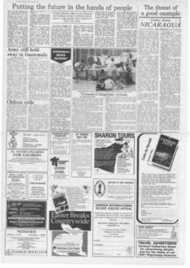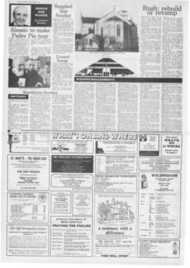Page 4, 6th March 1987
Page 4

Report an error
Noticed an error on this page?If you've noticed an error in this article please click here to report it.
Tags
Share
Related articles
Protect Marcinkus, But Disown Bruce Kent?
Bruce Kent Resigns `active Clerical Ministry'
Kent's War For Peace
Essential Political Peace Witness
Mgr Kent 'not Wrong In Canon Law' Expert
Bruce Kent a modern prophet
THE decision of Mgr Bruce Kent to resign the "active clerical ministry" has been widely (mis)interpreted. Evening Standard billboards reported him, erroneously, as leaving the Church. The Daily Telegraph saw him as hell bent on a clash with Mrs Thatcher over defence. Even a highly placed aide to Cardinal Hume, in a national newspaper, took the opportunity, with misplaced concern, if not malice, to speculate on Mgr Kent's possibilities for marriage.
They all seem to have missed the two crucial and fundamental issues at stake in this sad incident for the Catholic Church in this country. Firstly there is the role of priests in taking a stance over a "political" issue. This has been thoroughly discussed on page three by Pax Christi's Fr Owen Hardwicke.
The second, and intimately linked, issue is that of the Church's stance on nuclear disarmament. Cardinal Hume in his statement on Mgr Kent's decision noted that he too "would oppose the arms race and the escalation or proliferation of nuclear weapons".
The cardinal no doubt makes that stance known in his meetings and consultations with those responsible for shaping our country's defence strategy. But how are ordinary Christians to express their opposition to the arms race? And what lead do they get from their bishops?
On Wednesday of this week several Christian peace groups protested outside the Ministry of Defence. They do this regularly — and are scorned by some for repeating a tactic that seems to have not the slightest effect on policy makers. But they are making a stand — expressing their Christian concern, refusing to brush the issue under the carpet.
One brave bishop, Victor Guazzelli, gave them his blessing. But in general the bishops as a body have been too silent on vital areas of this debate. Their November statement on the need for peace and the havoc that fear causes was fine as far as it went. But it needed to go much further.
Cardinal Hume's line has always been one which is capable of accommodating a wide variety of stances on the nuclear issue. He restates in his declaration of last week that he upholds the papal stance that in the current climate deterrence is "morally acceptable."
But this is surely a line which is too political, and which has too little to do with the teaching of the Church. A politician may hold that deterrence has maintained the peace for 40 years, but should a Church which must stand at least one step removed from the pragmatism of politicians notmake a moral judgement on disarmament? And particularly the central inbuilt implication in deterrence that the holder of the weapon is prepared to use it. Can the Church morally support a policy that has as a central plank the willingness to unleash mass destruction on the world?
The answer must be no. The Scottish bishops recognised this and have clearly stated that if it is immoral to use nuclear weapons, then it is also immoral to threaten their use.
And what is more, if as Cardinal Hume stated last week, the Church holds that deterrence is only "a temporary step on the way to a progressive disarmament", how can the Vatican then suppress a Pontifical Academy of Sciences report that is critical of "Star Wars"?
"Star Wars" will stop for ever the concept of deterrence being a "temporary step". The Church must speak out against it now, and expose it for what it is — a further and deadly escalation of the arms race.
These are issues that are of vital concern for the human family. To many the Church has maintained a silence for too long, or at best taken what can only be seen as a position of political pragmatism. Bruce Kent is not the one who is getting involved in politics in this sense. Rather he is the one who is speaking out fearlessly — a modern day prophet in a desert of silence.
Bruce Kent has consistently challenged the Church and Christians to examine the issue of nuclear deterrence from a standpoint of morality and from a concern for peace. Even if at times he has taken the argument too far for some, his prophetic voice within the Church will be sorely missed.
He will now speak from the ranks — not the pulpit — but the message is too important to go away. And Bruce Kent, active cleric or not, will always demand attention, on a world stage.
blog comments powered by Disqus











